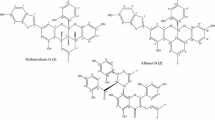Abstract
Alzheimer’s disease (AD) is a progressive degenerative neurologic disorder resulting in impaired memory and behavior. A promising treatment strategy for AD has been the use of acetylcholinesterase (AChE) inhibitors. Several potent AChE inhibitors such as huperzine and galanthamine were originally isolated from plants, indicating that herbal medicines are a good source for the search of potential AChE inhibitors. In our study, to search for potential AChE inhibitors, the total alkaloidal extracts of 31 Chinese herbal medicines were tested for their AChE inhibitory activities by Ellman’s method and modified TLC bioautographic assay. The results showed that the alkaloidal extracts of Uncaria rhynchophylla (Rubiaceae), Nelumbo nucifera (Nymphaeaceae), Zanthoxylum nitidum (Rutaceae), Portulaca oleracea (Portulacaceae), and Pinellia ternata (Araceae) exhibited remarkable AChE inhibitory activities at the final concentration of 100 μg/ml. Their IC50 values were 10.8, 12.2, 17.4, 29.4, and 56.2 μg/ml, respectively. The rest of the alkaloidal extracts showed no or very weak AChE inhibitory activities at the same concentration. The results of this study indicate that the screening of traditional Chinese herbs for AChE inhibitory activity may provide useful lead compounds in the discovery of new drugs for the treatment of AD.

Similar content being viewed by others
References
Adams RL, Craig PL, Parsons OA (1986) Neuropsychology of dementia. Neurol Clin 4:387–404
Di Giouanni S, Borloz A, Urbain A, Marston A, Hostettmann K, Carrupt PA, Reist M (2008) In vitro screening assays to identify natural or synthetic acetylcholinesterase inhibitors: thin layer chromatography versus microplate methods. Eur J Pharm Sci 33:109–119
Ellman GL, Courtney KD, Andres V, Featherstone RM (1961) A new and rapid colorimetric determination of acetylcholinesterase activity. Biochem Pharmacol 7:88–95
Houghton PJ, Ren YH, Howes MJ (2006) Acetylcholinesterase inhibitors from plants and fungi. Nat Prod Rep 23:181–199
Ingkaninan K, Temkitthawon P, Chuenchom K, Yuyaem T, Thongnoi W (2003) Screening for acetylcholinesterase inhibitory activity in plants used in Thai traditional rejuvenating and neurotonic remedies. J Ethnopharmacol 89:261–264
Jann MW (1998) Preclinical pharmacology of metrifonate. Pharmacotherapy 18:55–67
Lin HQ, Ho MT, Lau LS, Wong KK, Shaw PC, Wan DCC (2008) Anti-acetylcholinesterase activities of traditional Chinese medicine for treating Alzheimer’s disease. Chem Biol Interact 175:352–354
Marston A, Kissling J, Hostettmann K (2002) A rapid TLC bioautographic method for the detection of acetylcholinesterase and butyrylcholinesterase inhibitors in plants. Phytochem Anal 13:51–54
Orhan I, Sener B, Choudhary MI, Khalid A (2004) Acetylcholinesterase and butyrylcholinesterase inhibitory activity of some Turkish medicinal plants. J Ethnopharmacol 91:57–60
Yang ZD, Zhang X, Duan DZ, Song ZW, Yang MJ, Li S (2009) Modified TLC bioautographic method for screening acetylcholinesterase inhibitors from plant extracts. J Sep Sci 32:3257–3259
Acknowledgments
This study is supported by the National Natural Science Foundation of China (No. 20802031) and the Excellent Young Teachers Program of Lanzhou University of Technology (No. Q200904).
Conflict of interest
The authors declare no conflict of interest.
Author information
Authors and Affiliations
Corresponding author
Rights and permissions
About this article
Cite this article
Yang, Z., Zhang, D., Ren, J. et al. Acetylcholinesterase inhibitory activity of the total alkaloid from traditional Chinese herbal medicine for treating Alzheimer’s disease. Med Chem Res 21, 734–738 (2012). https://doi.org/10.1007/s00044-011-9582-8
Received:
Accepted:
Published:
Issue Date:
DOI: https://doi.org/10.1007/s00044-011-9582-8




